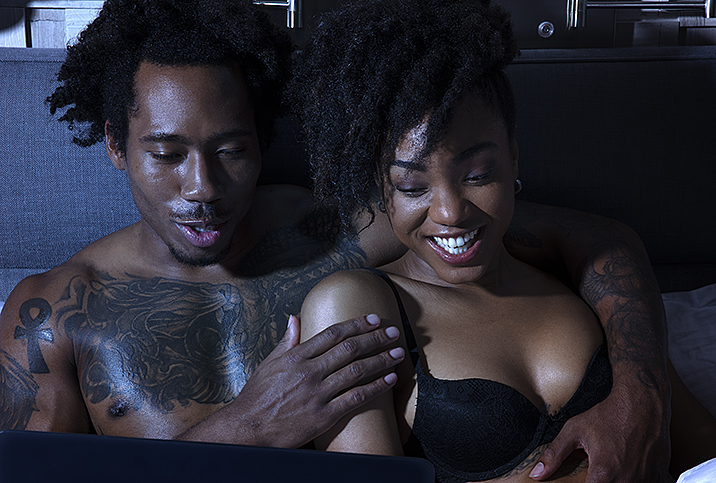Could My Low Sex Drive Actually Be Responsive Desire?

You've certainly seen the rom-com scene where two characters walk home from a date, look at each other lovingly and, suddenly, they're pressed against a wall getting it on. It's like their sex drive caught fire.
This spontaneous and exciting way of being turned on is how sexual desire is depicted in movies and on TV. In some ways, Hollywood has it right: Lots of people want sex from one glance alone. But an equal number of people, if not more, don't desire sex until after they're having it.
Yes, you read that right. Many people don't get turned on until after they're playing with sex toys, being kissed in all the right spots or watching porn.
This phenomenon is known as responsive desire. While it's natural and healthy, many people mistake it for low libido because it doesn't match up with what they see in the media.
If you're someone who doesn't relate to rom-com sex scenes or perhaps you notice it takes more than the thought of sex to get turned on, you're not alone. Find out why this happens, the reasons it may not be low libido and what your sex drive should be, and how this tendency can affect your sex life.
What is responsive desire?
Responsive desire is a healthy and natural way to get turned on that requires being exposed to erotic stimuli, such as touching your erogenous zones, having an erotic massage or watching porn.
Whitni Miller, a pleasure coach and yoga facilitator in Tennessee, said someone with responsive desire typically engages with sex after they start having it because they "feel arousal—a physiological response—before they mentally 'want' for sex."
For example, you have an erection or get wet and then you desire sex. This means you often have to proactively engage in activities that turn you on.
Two other types of sexual desire are spontaneous desire and context-dependent desire. In order to understand how you and your libido work, it's helpful to know how these types of desires work.
What is spontaneous desire?
This is the type of desire we see most often in the media: Two people take one look at each other across the bar and before you know it, they're getting hot and heavy. Spontaneous desire can make you feel like you want sex almost out of the blue. Just one thought of your partner or how good sex feels have you ready for action.
What is context-dependent desire?
This type is pretty much just like it sounds. The way you desire sex depends on the context of the situation. For example, at the beginning of a relationship, you want sex a lot and it can be sparked by just seeing your partner or thinking about their touch. Over time, though, as the context of your relationship changes, sexual desire doesn't feel so spontaneous. It might take more work to get in the mood or perhaps you need to schedule desire, setting aside time to have sex.
The way you experience desire can change from day to day, too, not just over long periods of time in a relationship.
Why is responsive desire mistaken for low libido?
Responsive desire is mistaken for low libido because porn, rom-coms, the stories our friends tell us and nearly every other sex scene we see depicts sexual desire as "this random, 'take me now' feeling that comes over us," said Yana Tallon-Hicks, L.M.F.T., who practices in Massachusetts and is the author of "Hot and Unbothered: How to Think About, Talk About and Have the Sex You Really Want."
"People then assume that because they don't have this spontaneous experience of desire then they must have low or no libido for sex," she added. "However, this isn't the case. Someone with responsive desire just requires other things to happen first in order for their libido for sex to be ignited."
So the problem isn't low libido.
"The problem is that we believe spontaneous desire is the only legitimate way to feel desire," Miller said. "In the absence of spontaneous desire, people interpret this as something 'wrong' or 'broken.'"
Low libido occurs when your specific level of desire and interest in sex decreases.
"[Low libido] is not meant to be a comparison to your partner's libido, for example, 'Your libido is low because it is less than mine,'" Miller explained. "Rather, low libido is an acknowledgment of what [your libido] used to be and where it is now."
Nearly everyone's libido changes throughout their life and there are ways to cope with it.
However, even this evaluation can get tricky. Remember context-dependent desire, and how people might experience spontaneous desire at the beginning of a relationship and shift to responsive desire down the line? Miller said this change in a long-term relationship can also be interpreted as low libido even when it's not.
Tallon-Hicks noted that you should think of low libido this way: "If you're someone who has responsive desire and you do all of your usual sexual context routines and your pilot light still isn't feeling 'lit,' perhaps you're experiencing low libido, which could be due to contributing factors such as hormonal changes, increased stress, relational strife or trauma triggers."
Experiencing low libido isn't necessarily a cause for concern. Nearly everyone's libido changes throughout their life and there are ways to cope with it.
For some women experiencing low libido, supplements may help address a lack of desire for sexual activity. Giddy Health Libido Boost vitamins can help you maintain a normal, healthy sex life. These supplements use EFSA-described transparent ingredients with formulations and dosages backed by science and research. The clinically proven ingredients include Panax Ginseng and Ashwagandha, which can enhance sexual arousal and satisfaction, including in women who report diminished libido for physical or psychological reasons.
Miller and Tallon-Hicks agreed that if you have responsive desire and you're not satisfied with the way your body works, the hard truth is you need to stop comparing yourself to someone with spontaneous desire and start being more compassionate toward yourself.
Responsive desire isn't a "dysfunction" that needs to be fixed, nor is it bad to take your time fueling your desire. Rather, work with your responsive desire by learning exactly what turns you on.
"And then prioritize those arousing activities, and have vulnerable conversations, read erotica together, exercise together, play together and laugh together," Miller said.
Tallon-Hicks recommended "engaging in some of your responsive context with yourself ahead of sexual interaction, such as emotionally engaging with your partner over the course of the day, taking sexy selfies to send to them or writing notes to yourself about what kind of sex you want to have later."


















